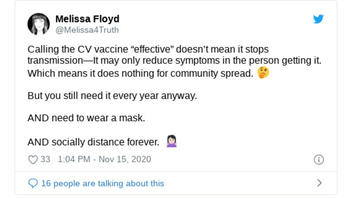
Does the first study of an effective COVID-19 vaccine show that it only reduces symptoms without stopping transmission? No, that's not true: The transmission part of the study is not complete, so it's too soon to say, either way. But, among infectious diseases that spread person-to-person, this would be the only vaccine that didn't both prevent infection of the vaccinated patient while also slowing community spread of the disease.
The U.S. Centers for Disease Control and Prevention and the Department of Health and Human Services have both long issued blanket advisories in favor of vaccination because (except in the case of soil-transmitted tetanus) vaccination prevents the vaccinated patient from getting sick and also prevents person-to-person transmission.
The premature claim that newly-announced COVID-19 vaccines "do nothing" for community spread appeared in a tweet (archived here) published by @melissa4truth on November 15, 2020. The post by Melissa Floyd, who calls herself the "health freedom educator," read:
Calling the CV vaccine "effective" doesn't mean it stops transmission--It may only reduce symptoms in the person getting it. Which means it does nothing for community spread. 🤔
But you still need it every year anyway.
AND need to wear a mask.
AND socially distance forever. 🤷🏻♀️
This is what the post looked like on Twitter at the time of writing:
(Source: Twitter screenshot taken on Mon Nov 16 21:36:45 2020 UTC)
This claim confuses two separate things, said Dr. Anna Wald, Head of the Allergy and Infectious Diseases Division at the University of Washington School of Medicine. "One, whether vaccines prevent community transmission - yes - and whether the current study shows it prevents community spread - not yet," Wald said in a November 16, 2020 phone interview with Lead Stories:
We have experience from other vaccines, knowing that's what vaccines do: they prevent community spread.
While she is awaiting the full long-term study of the effects of the two COVID-19 vaccines that have been announced this month, Wald said it would be "bizzare" if the vaccine that has been shown to prevent COVID-19 does not also slow community spread. She said it's only logical:
There's no placebo, control group study that you need a parachute to jump off a plane. You have to be a little reasonable, here.
Dr. Otto Yang, a professor of medicine in the infectious diseases division at the David Geffen School of Medicine at UCLA, wrote in a November 16, 2020 email to Lead Stories that it is unlikely a COVID-19 vaccine will not slow spread of the disease.
It is within the realm of possibility, although far-fetched. Generally, the amount of virus tracks with the degree of symptoms, and the amount of virus determines contagiousness. Even though SARS-CoV-2 is contagious up to 2 days before symptoms, it is most contagious early after symptoms develop. So, it would be extremely surprising if the vaccine stopped symptomatic disease without reducing or stopping virus production.
What stops Dr. Wald from flat-out declaring the new vaccines prevent community spread is that there hasn't been the kind of research and data analysis examining a vital distinction: whether the vaccine prevents coronavirus infection or fights the resulting disease, COVID-19 or does both. "What we know about biology is that doesn't really make any sense. If you stop severe disease, you will actually stop transmission as well," but she said that's what makes her work as a vaccinologist interesting. Wald and her University of Washington colleagues faced the first major outbreak of COVID-19 in the U.S. and she now works full-time on clinical research and also treating COVID patients. She said Tetanus is the only vaccine that cannot be said to prevent community spread, since since it does not spread person-to-person. It's spread when cuts or other punctures in the skin are exposed to contaminated soil or manure.
Yang dismissed out of hand the Twitter post's claim that vaccination will not slow or stop the spread of COVID-19:
Smallpox was eradicated globally through vaccination, not any other measures. Polio is almost gone; at least one strain of it has gone extinct. Diseases like measles are essentially gone from the USA...Saying that vaccines don't reduce spread of illnesses through populations is so illogical it's hard to argue against. It's as if I were to say 'seat belts don't save lives.' Well, all the data say they do.
None of the official announcements about COVID-19 vaccines being found to be effective have declared it will need to be renewed yearly, or that people will have to socially distance "forever." The only vaccine announcement available at the time Floyd posted her claims was this news release by Pfizer and BioNTech which said the vaccine candidate they have developed was more than 90% effective in preventing COVID-19 in study participants who showed no signs of prior SARS-CoV-2 infection. At the time of writing, no COVID-19 vaccine had been approved by the FDA.
Floyd is half of a podcast team that takes a generally skeptical view of vaccination. She lists her credentials as "health freedom educator" and mother.
The CDC's scientists strongly encourage vaccination, both to prevent your own illness, and also to slow the spread of infectious disease:
Most vaccine-preventable diseases are spread from person to person. If one person in a community gets an infectious disease, he can spread it to others who are not immune. But a person who is immune to a disease because she has been vaccinated can't get that disease and can't spread it to others. The more people who are vaccinated, the fewer opportunities a disease has to spread.
The U.S. Department of Health and Human Services similarly urges vaccination as a means of wiping out infectious disease:
That means even people who can't get vaccinated will have some protection from getting sick. And if a person does get sick, there's less chance of an outbreak because it's harder for the disease to spread. Eventually, the disease becomes rare -- and sometimes, it's wiped out altogether.


















